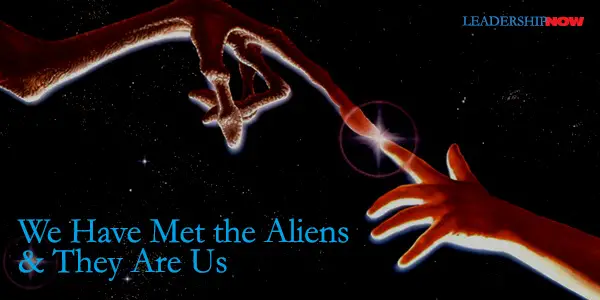 |
 |
04.28.10

We Have Met the Aliens and They Are Us
WE live in a time—aided by advances in science and communication—that is obsessed with quantifying, labeling and optimizing. Generational studies are no different. While identifying and labeling the generations is valuable for understanding and discussion, if we are not careful we can lose some connection to their humanity—their sameness. While generational studies can help us to understand where people are at, if want to engage them, we would do well to remember what they are. A generation comes and a generation goes. Each carries with them their own reaction to the former generation that raised them and their own disbelief of the reactions of the next generation to their own. Yet, each generation is not a new subset of humans; a curious new life form that needs to be studied and obsessed over. They are human. They are like us. "That which seems the height of absurdity in one generation often becomes the height of wisdom in another." We do a disservice to any generation when we coddle them and commoditize them. What generation doesn’t want everything just right? But life doesn’t work like that. Our ideals keep us pushing on, exploring, reflecting, and innovating, but our disappointments and the imperfections we uncover, help us to learn compassion and build character. Every generation has difficulties to overcome and excesses to curb. Every generation is faced with the prospect of growing up. And each generation does it from a different perspective. A perspective that they gained from their observation of those that came before them. And they will hand a different perspective, a different emphasis, over to those that come after them. "Parents often talk about the younger generation as if they didn't have anything to do with it." Like us, they are reacting to their upbringing and the world it created and bringing with them an attempt to find some greater idealism. Similarly, they need to learn balance, curb excesses, and rediscover forgotten behaviors and values. They need to learn compassion, the freedom that comes from admitting that you don’t know it all, and the value in what has come before them. No one generation excels completely in all things. All have different pieces of the life puzzle. All begin by placing a different weight on what is important and need to work to find the balance that makes their life more complete. We all share a humanity that spans generations. Human nature doesn’t change. Not everything the previous generation did was bad. Often it was good and necessary, but was executed poorly. We can be thankful that while previous generations were concerned with “work-life balance,” they decided they had better keep their focus on the tiller so that we would have the opportunity to run on the deck, criticize their methods, and endlessly debate whether or not the figurehead represents us well. "When I was a boy of fourteen, my father was so ignorant I could hardly stand to have the old man around. But when I got to be twenty-one, I was astonished at how much he had learned in seven years." A study of generational differences, more than anything, helps us to understand the consequences of our behaviors. What has worked and what hasn’t. Why an over-emphasis on this causes a problem there. If we can learn from it, we profit. However, our natural reactivity causes us to not learn as we should or build on the lessons of those that came before us. Human beings are not hard-wired with the lessons learned from the previous generation. So we all start at the beginning—learning and relearning—in the context of the world we find ourselves in. Each generation must come to the same place at the end of their lives as the one before it. All need to grow up. We need to become practiced at learning from each other; valuing each generation for where they have been, what they are learning, and the perspective they bring. In a more connected world, the consequences of our behavior are greater. We have more reach. What we do affects more people and for longer periods of time. This creates a critical need for wise leadership. Each generation will rewrite their world. Their thoughts and ideals aren’t new. Their emphasis is. “Treat Millennials with respect and dignity. Don’t over-manage them. Make them feel included.” Really? This isn’t generation-specific. We all desire those things. Generational analysis also reminds us that not everyone sees things the way we do. “By understanding other generations’ perspectives,” writes Tamara Erickson in What’s next, Gen X?, “we are better able to position our ideas and requests in ways that are likely to have positive results and avoid at least some of the frustrations of today’s workplace.” There are many good books in print that help to highlight the challenges that current generations face, their perspectives, and how we might learn from each other, and offer points of connection to help bridge the gaps. Here are several:
All generations face the same human issues but from different perspectives and with different tools. But they all look for connection, meaning, and contribution. They all want to add value and feel the satisfaction of a job well done.
Posted by Michael McKinney at 01:28 PM
|
BUILD YOUR KNOWLEDGE
 

How to Do Your Start-Up Right STRAIGHT TALK FOR START-UPS 
Grow Your Leadership Skills NEW AND UPCOMING LEADERSHIP BOOKS 
Leadership Minute BITE-SIZE CONCEPTS YOU CAN CHEW ON 
Classic Leadership Books BOOKS TO READ BEFORE YOU LEAD |